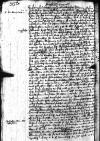Unserenn freuntlichenn grus und alles guts zuvorann. Ersame, namhaftige hernn, bosundere, gutte freunde.
Dieweil die hernn von ⌊lande und stedten⌋ ⌊koninglicher majestet⌋, unsers allergnedigsten hernn, / dieser seiner majestet lande ⌊Preusenn⌋ ⌊redte⌋ / sich ihr und alwegenn alles guttes czu Ewer Erbarkeit als zu ihre[n] gutten und zugethanenn freundenn vorshenn, / und nu dieses koningl...enn orts swere hendel und obligenn, / so in diesen gezeitenn vorfallen erfurderenn, / das aus ihrem mittel ein statliche botschaft / an hochgedachtenn unsernn aller gnedigsten heren ⌊koningliche majestet⌋ zu ⌊Polan⌋ / im angesatzte reichs ⌊tagfarth⌋ kegen ⌊Pieterkow⌋ sol gefertiget werden, zu welcher ausrichtung der hochwirdige in Got, her ⌊Tidemannus⌋, von Gots genaden bischof zu ⌊Colmenshe⌋, / der grosmechtige her ⌊Achatius Czem⌋, marienburgischer woiwod, aufm ⌊Sthum⌋ heuptman, und andere / seindt von a[l]len stenden vormocht und angesatzet, / die auch kurtz nach angange des ⌊reichstag⌋ sich kegen ⌊Peterkow⌋ zubegeben und ihre gewerbe anbringen bodocht sein. / Nachdem sich aber die hern ⌊redte⌋ nebe[n] uns bosuchen, / das vieleichte wenig ader gar keine beku[e]mickeit / auf der hernn dieser lande botschafter / zu ⌊Peterkow⌋ / ankommen, / mochte sein zubokommen, / da sie sich mit ihrem lager, / pferden und gesinde enthalten kunten, / sunderlich dieweil die stadt unlengst durchs fewer schaden gelitten, / und nach nicht allenthalben erb[aut(?)] , / ihnen auch allen neben uns wissentlich ist, / das ... alda ihren erbauten hof habenn, / den Ewer Erbarkeit / vor dismol vieleichte nicht gebrauchen werdenn, / haben sie an uns semptl... aus obgedochter freuntlicher zuvorsicht, / die sie zu Ewer Erbarkeit tr... bogeret / von ihrer aller und unsernt wegenn dis an Ewer Erbarkeit gelangen zulassenn, / und umb gedochten ihren hof, den Ewer Erbarkeit vor Peterkow habenn, und diesen reichstag vorsich nicht gebrauchen werdenn, / fr[eunt]lich diesulben zubittenn, / damit vielgenantenn her[n] botschaftern, / dersulbe zu ihrer notturft, / so lange sie ob... vorharren, / mochte vorgunstet werdenn. Demnach bitten wir Euer Erbarkeit in vielgedochter hern ⌊redte⌋ / und unserm namen / gantz freuntlich, / ihnen und uns solchs vor dismol , / daran uns viel gelegen, / nicht zu vorsag[en], sunder sich / mit vorleiung ihres hofes zu ⌊Peiterkow⌋ gedochten hern botschaftern freun[t]lichenn erzeigenn. Wo das herwidder die hernn ⌊red[te]⌋ und wir / mit vielen zugethanem furderlichen willen / werd[en] kegen Ewer Erbarkeit / , die wir gotlichen genaden mit langweriger gesuntheit bovelen, / uns die hern tatlichen vorschulden kunnen, / findet ihr sie und uns idere zeit darzu willig u[nd] erputtig.
